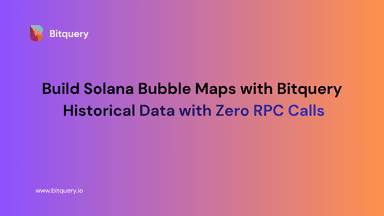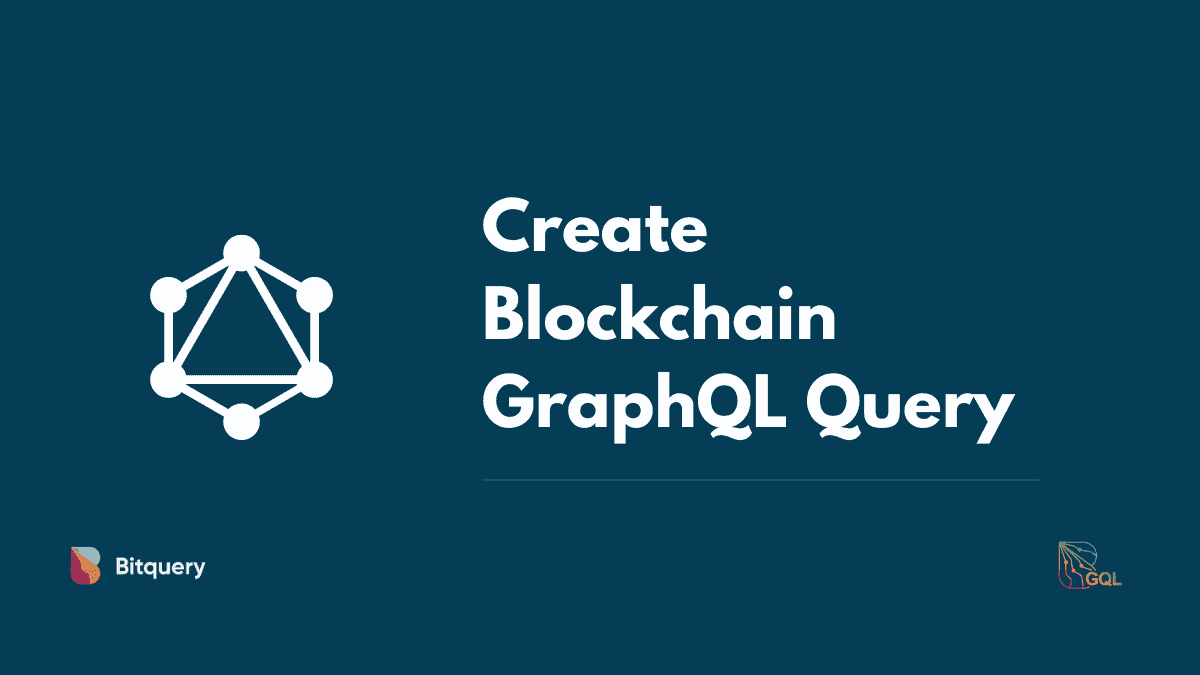
Create your first Blockchain GraphQL query
In the previous article, we have argued why you should GraphQL over Rest for blockchain data APIs. In this article, we will talk about some basic concepts of GraphQL in the context of Bitquery and show steps to create a simple GraphQL query.
GraphQL Query
If you have never seen a GraphQL query, the following image shows an example.
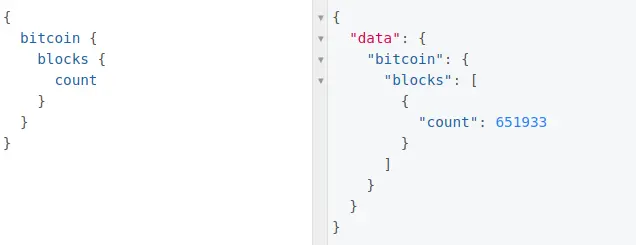
The left side is the query, and the right side showing the result.
As you can see, query and result look similar because, in GraphQL, your query actually specifies what exact data you are looking for.
- We start with a special “root” object.
- We selected the data hierarchy based on the schema to get the desired result.
GraphQL Types
GraphQL types area basically data objects that contain one or multiple fields. For example, in the image above.
bitcoinis a type with theblocksfield.
GraphQL Type System
GraphQL is a strongly typed language. Type System defines various data types that can be used in a GraphQL application. The type system helps to define the GraphQL schema. All the queries validated and executed against that schema.
What is GraphQL schema?
GraphQL server uses a schema to describe the shape of your data graph. This schema defines a hierarchy of data types with fields.
GraphQL schema is a contract between the client and the server, which specifies exactly which queries and mutations are available for clients to execute against your data graph.
How does GraphQL Schema will help to use Bitquery?
GraphQL schema is a documentation of our APIs.
With GraphQL schema, you can search for types available in the APIs, different fields of those types, and their data format.
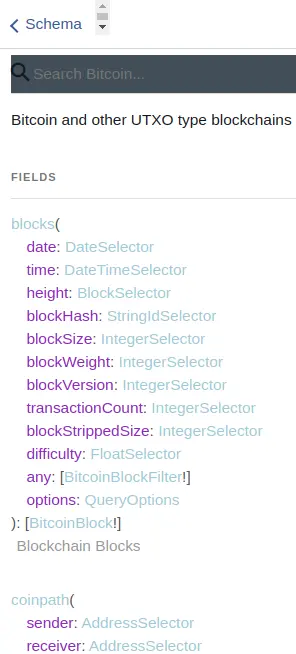
GraphQL Playground
GraphQL playground is where you will spend most of your time when integrating which Bitquery.
The playground allows you to create and run your queries and see the results. Besides, it also has an embedded Bitquery GraphQL schema.
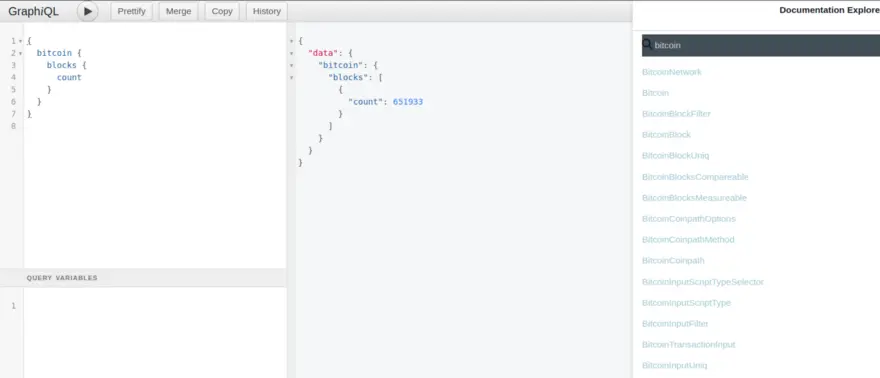
Creating Queries
Now, let’s create a simple GraphQL query using the Bitquery GraphQL playground.
Note: Our GraphQL queries support more than 20 blockchains such as Ethereum, Zcash, Cardano, etc. Therefore you can query any blockchain using our APIs.
Getting the latest bitcoin blocks
So let’s say we want to create a query to get the latest Bitcoin blocks details. So, let’s see step by step process of creating this query.
- First, we need to search the schema for the
Bitcointype.
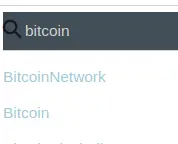
- Once found, click on
Bitcointype to see the fields available. As you can see, we found theblocksfield.
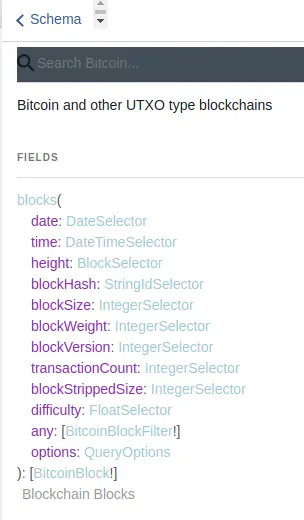
- So, for now, our query looks like below. As you can see, it’s showing a red underline, indicating there is some error. As we mentioned above, GraphQL is a strongly types language; therefore, you see this validation error.
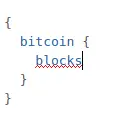
- As you can see in the above image,
blocksis also a type that contains multiple fields. We also need to mention whatblocksfields we want in our query. Let’s say we want only to see the block height, so let’s mention that.
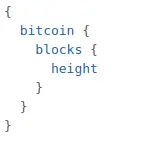
- But before we run this query, let’s limit the results first.
Note: You can see the available query option in the blocks schema.
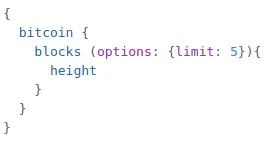
- Now, when you run this query, you will get the following result.
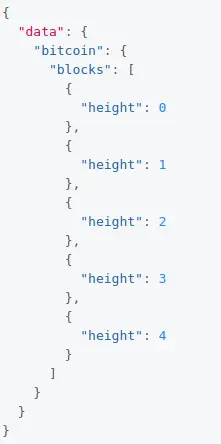
- But we want the latest bitcoin blocks, not the oldest. So we need to sort them based on the height.
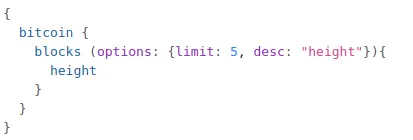
- Now, rerun the query, you will get the following results.
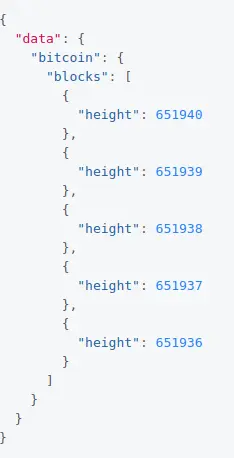
- If we want to get more details about these blocks, we just need to add it to the query. You can check
blocksschema, to know what block fields you can query.
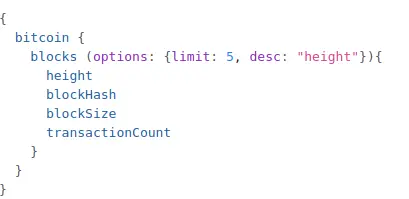
- Once you are done with your query, you can use them programmatically in your applications. Our GraphQL endpoint is — graphql.bitquery.io. Unlike Rest, where every APIs have different endpoints, in GraphQL, all the APIs use the same endpoints.
Using examples to create queries
If you want to see more examples of GraphQL queries, you can check our blockchain explorer. On our explorer, every widget is created using GraphQL queries. You can just click on the GraphQL button on the bottom right corner to see the query.
You can also modify these queries to get the desired results.
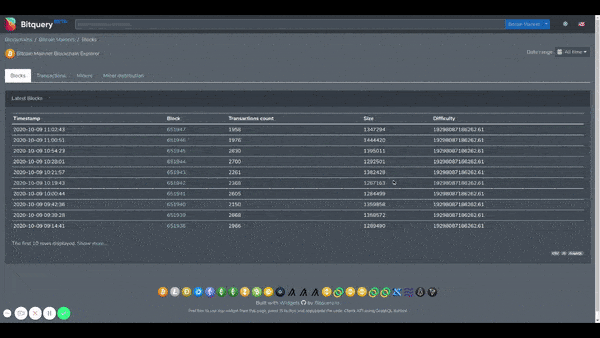
Wrapping Up
Using GraphQL, you can write expressive queries to get the exact data you want. You can leverage the schema to understand what kind of data you can get using our APIs.
In the next article, we will talk about how to use arguments in your GraphQL queries.
If you have any questions or need help with queries, just hop on our Telegram channel. Also, let us know if you are looking for blockchain data APIs.
You might also be interested in:
- API to get Ethereum Smart Contract Events
- Why GraphQL is better for blockchain data APIs
- APIs to get Latest Uniswap Pair Listing
- Simple rest APIs to get Uniswap data (DEX Data APIs)
- API to Get Ethereum Token Balance
- Simple API To Get Ethereum Supply And Data
- Who is actually using Ethereum?
- How to get newly created Ethereum Tokens?
- Querying Binance Smart Chain (BSC)
About Bitquery
Bitquery is a set of software tools that parse, index, access, search, and use information across blockchain networks in a unified way. Our products are:
-
Coinpath® APIs provide blockchain money flow analysis for more than 24 blockchains. With Coinpath’s APIs, you can monitor blockchain transactions, investigate crypto crimes such as bitcoin money laundering, and create crypto forensics tools. Read this to get started with Coinpath®.
-
Digital Assets API provides index information related to all major cryptocurrencies, coins, and tokens.
-
DEX API provides real-time deposits and transactions, trades, and other related data on different DEX protocols like Uniswap, Kyber Network, Airswap, Matching Network, etc.
If you have any questions about our products, ask them on our Telegram channel. Also, subscribe to our newsletter below, we will keep you updated with the latest in the cryptocurrency world.
Subscribe to our newsletter
Subscribe and never miss any updates related to our APIs, new developments & latest news etc. Our newsletter is sent once a week on Monday.


